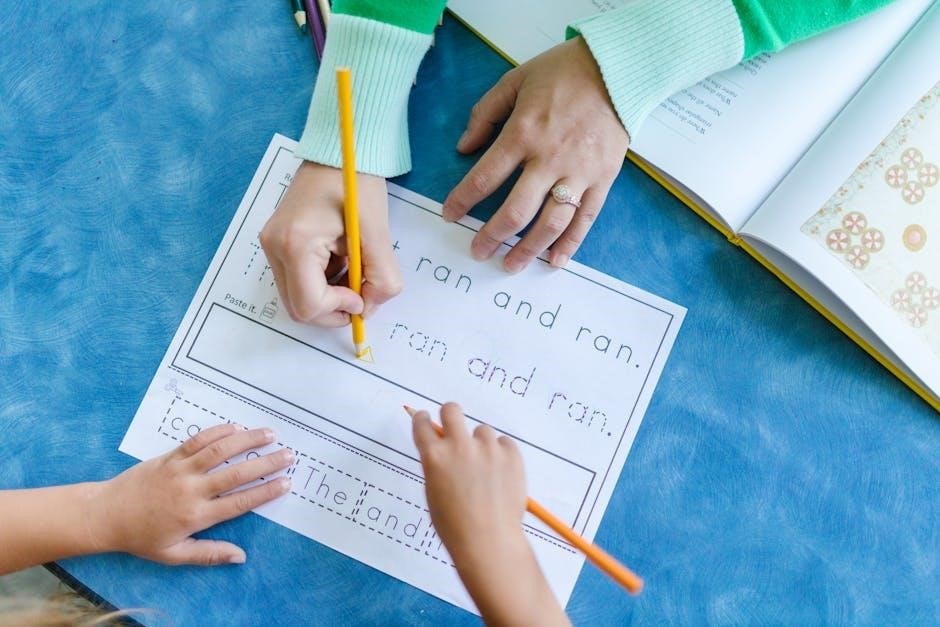Reading Mastery Grade K is a structured program designed to teach foundational reading skills, focusing on phonics, decoding, and fluency. It uses modified orthography to support early learners.
1.1 Overview of the Reading Mastery Program
The Reading Mastery program is a comprehensive, research-based curriculum designed to teach foundational reading skills to students from kindergarten through 6th grade. It emphasizes systematic instruction in phonics, decoding, and fluency, ensuring students build a strong base for lifelong reading proficiency. The program is structured to deliver explicit, scaffolded lessons that align with the needs of early learners, particularly in Grade K. Key components include modified orthography to support beginning readers and a focus on mastery of skills before progression. The program also incorporates placement tests to determine the appropriate starting point for each student, ensuring personalized instruction. Acceleration options are available for advanced learners, allowing for flexible pacing. The ultimate goal is to equip students with the skills and confidence to become independent readers.
1.2 Importance of Reading Mastery in Early Education
Mastering reading skills in early education is crucial for a child’s academic and personal development. Reading Mastery Grade K plays a vital role in building foundational literacy skills, ensuring students develop phonemic awareness, decoding abilities, and fluency. Early proficiency in reading enhances overall academic performance, as it is the cornerstone for learning across all subjects. The program’s structured approach helps students gain confidence and a strong understanding of language, which fosters a lifelong love for reading. Research shows that early mastery of reading skills significantly impacts future academic success and reduces the risk of learning difficulties. By prioritizing reading education in kindergarten, educators set the stage for students to excel in later grades and beyond.
1.3 Key Features of the Grade K Curriculum
The Grade K curriculum in Reading Mastery is specifically designed to introduce young learners to essential reading skills. It incorporates systematic phonics instruction, emphasizing letter-sound relationships and blending sounds to form words. The program uses modified orthography, a gradual phasing out of visual supports, to help students transition to standard text. Engaging stories and informational passages are included to promote comprehension and fluency. Interactive exercises and activities reinforce learning, making the lessons dynamic and engaging. Additionally, the curriculum aligns with early childhood education standards, ensuring a comprehensive approach to literacy development. These features collectively create a robust foundation for Kindergarten students to master reading skills effectively.

Curriculum Structure and Scope
Reading Mastery Grade K is organized into structured lessons, focusing on foundational skills like phonics, decoding, and comprehension. It integrates engaging stories and informational passages to build literacy proficiency.
2.1 Scope and Skills for Reading Mastery in Grade K
The Reading Mastery Grade K curriculum emphasizes foundational reading skills, including phonemic awareness, decoding, and comprehension. It integrates structured lessons and interactive activities to ensure mastery of early literacy concepts.
2.2 Story and Informational Passage Reading Lessons

Reading Mastery Grade K includes engaging story and informational passages designed to build early reading skills. These lessons focus on phonics, comprehension, and fluency, with structured activities to ensure mastery. Stories are crafted to introduce new vocabulary and sentence structures, while informational texts teach students to extract key details. The program incorporates interactive exercises, such as identifying story characters, settings, and main events, to reinforce understanding. Additionally, lessons include guided practice to help students decode unfamiliar words and read with accuracy. The combination of narrative and nonfiction passages prepares young learners for diverse reading experiences, fostering a strong foundation in literacy. These lessons are tailored to meet the developmental needs of kindergartners, making reading both enjoyable and effective.

2.3 Progression and Acceleration Options
Reading Mastery Grade K offers flexible progression and acceleration options to cater to diverse learning needs. The program includes placement tests to determine students’ starting points, ensuring they begin at an appropriate level. For advanced learners, accelerated pathways allow teachers to move students through lessons more quickly, providing additional challenges. Modified orthography is used in early lessons to simplify text, gradually fading as students gain proficiency. Teachers can also use provided charts to coordinate instruction for accelerated students, ensuring seamless transitions. This structured yet adaptable approach supports individualized learning, helping students build confidence and mastery at their own pace. The program’s design ensures that all learners, regardless of their starting point, receive the support and challenges needed to excel in reading.

Instructional Strategies and Methods
Reading Mastery Grade K employs systematic phonics, decoding skills, and guided practice to build fluency. Interactive exercises and engaging activities promote active learning and mastery of foundational reading skills effectively.
3.1 Phonics and Decoding Skills Development

Reading Mastery Grade K emphasizes systematic phonics instruction, teaching students to decode words by sounding out letters and blending sounds. This approach ensures mastery of foundational reading skills, enabling early readers to recognize patterns and build confidence. The program incorporates modified orthography, gradually introducing standard print in Grade 1, to support young learners in understanding the relationship between sounds and letters. Interactive exercises and decodable stories reinforce phonics concepts, helping students apply their knowledge in meaningful contexts. By focusing on explicit instruction and practice, Reading Mastery equips Kindergarten students with the tools needed to decode unfamiliar words and read with accuracy and fluency.
3.2 Guided Practice and Fluency Building
Reading Mastery Grade K incorporates guided practice and fluency-building activities to help students develop smooth and accurate reading skills. The program emphasizes repeated reading of decodable stories and passages, allowing students to practice newly learned phonics patterns in context. Teachers provide feedback and support during these sessions, helping students refine their reading abilities. Fluency is further enhanced through interactive exercises, such as reading aloud with expression and identifying punctuation marks. The curriculum also includes timed readings to encourage students to read with increasing speed and confidence. By fostering a consistent and engaging practice routine, Reading Mastery helps Kindergarten students transition from sounding out words to reading with ease and comprehension.
3.3 Interactive Exercises and Activities
Reading Mastery Grade K integrates interactive exercises and activities to engage young learners and reinforce reading skills. These activities include matching games, fill-in-the-blank exercises, and identifying words or sentences in context. Students participate in hands-on tasks, such as sorting words by sounds or building simple sentences, which enhance phonemic awareness and language skills. The program also incorporates decodable stories, allowing students to apply newly learned phonics patterns in meaningful contexts. Digital supplements provide additional interactive elements, such as audio-supported readings and virtual word-building exercises, to cater to diverse learning styles. These activities are designed to make learning fun and effective, ensuring students stay motivated and actively involved in their reading development.
Core Skills and Concepts
Reading Mastery Grade K focuses on phonemic awareness, alphabet knowledge, and basic writing skills. It integrates language development through interactive exercises and decodable stories to build foundational literacy.
4;1 Phonemic Awareness and Alphabet Knowledge
Reading Mastery Grade K emphasizes phonemic awareness and alphabet knowledge as critical foundational skills. It introduces students to the relationship between sounds and letters, using systematic instruction. Activities include identifying and manipulating sounds in words, blending phonemes, and segmenting syllables. The curriculum incorporates modified orthography to help young learners recognize letter-sound patterns. Alphabet knowledge is reinforced through interactive exercises and decodable stories, ensuring students understand the connection between letters and their sounds. These skills are essential for decoding and spelling, providing a strong base for future reading proficiency. The program’s structured approach ensures mastery through guided practice and repetition.
4.2 Comprehension Strategies and Questioning Techniques
Reading Mastery Grade K integrates explicit instruction in comprehension strategies, fostering early understanding of texts. Students learn to identify story parts, make predictions, and summarize. Questioning techniques are modeled by teachers to encourage critical thinking and verify comprehension. The program incorporates interactive exercises and discussions, ensuring students engage deeply with material. Comprehension skills are reinforced through decodable stories and informational passages, aligning with phonics instruction. These strategies build a foundation for independent reading and higher-level thinking, ensuring students can interpret and analyze texts effectively. The structured approach scaffolds skills, preparing students for more complex reading tasks in later grades.
4.3 Integration of Writing and Language Skills
Reading Mastery Grade K seamlessly integrates writing and language skills, reinforcing the connection between reading and writing. Students engage in structured writing activities, such as sentence writing and journaling, to apply phonics and language knowledge. The program includes explicit instruction in grammar, punctuation, and spelling, with opportunities for creative expression. Writing tasks are scaffolded to support students at varying skill levels, ensuring mastery of foundational skills. Interactive exercises and discussions further enhance language development, fostering clear and effective communication. The integration of writing and language skills prepares students for more complex literacy tasks, promoting a comprehensive understanding of language structure and usage. This holistic approach ensures students develop both reading and writing proficiency simultaneously, building a strong foundation for future academic success.

Assessment and Placement
Reading Mastery Grade K uses placement tests to determine starting points, ensuring tailored instruction. Progress is monitored through regular assessments, with diagnostic tools providing insights for remediation and accelerated learning paths.
5.1 Placement Tests for Grade K Students
Placement tests for Reading Mastery Grade K determine students’ starting points, ensuring instruction aligns with their skill levels. These tests evaluate foundational abilities, such as phonemic awareness, alphabet knowledge, and basic decoding skills. The results help teachers identify whether students should begin at lesson 1, lesson 11, or transition to Reading Mastery: Fast. The tests are designed to assess readiness for structured phonics instruction and fluency building. By pinpointing each student’s strengths and needs, the placement process ensures personalized learning paths. Teachers use these insights to group students effectively and deliver targeted instruction. The tests are integral to the program’s mastery-based approach, ensuring no student falls behind or is misplaced in the curriculum sequence.
5.2 Monitoring Progress and Mastery
Monitoring progress and mastery in Reading Mastery Grade K involves regular assessments to track students’ growth in reading skills. Teachers use specific tools to evaluate fluency, comprehension, and decoding abilities. These assessments help identify areas where students may need additional support or enrichment. The program emphasizes frequent check-ins to ensure students are meeting benchmarks and progressing at an appropriate pace. Data from these assessments inform instructional decisions, allowing teachers to tailor lessons to individual or group needs. This ongoing monitoring ensures that all students achieve mastery of foundational reading skills before advancing. The structured approach of Reading Mastery Grade K supports continuous improvement and helps build a strong reading foundation for future academic success.
5.3 Diagnostic Tools and Remediation Strategies
Reading Mastery Grade K incorporates diagnostic tools to identify students’ specific skill gaps, ensuring targeted support. These tools assess phonemic awareness, decoding, and comprehension abilities, providing insights into areas needing intervention. Remediation strategies include tailored exercises, small-group instruction, and scaffolded learning to address deficits. The program offers supplementary materials, such as decodable stories and interactive activities, to reinforce skills. Teachers can use progress data to adjust instruction, ensuring students receive the support needed to master foundational reading skills. The structured approach of Reading Mastery Grade K allows for early identification of challenges, enabling prompt and effective remediation. This ensures all students build a strong reading foundation, preparing them for future academic success.
Implementation and Teacher Resources
Reading Mastery Grade K implementation is teacher-led, utilizing comprehensive materials like workbooks and digital supplements. Teacher training and parental involvement are emphasized to support effective program delivery.
6.1 Teacher’s Role in Delivering the Curriculum

Teachers play a pivotal role in implementing Reading Mastery Grade K, guiding students through structured lessons and activities. They utilize comprehensive materials like workbooks, digital supplements, and placement tests to tailor instruction. The program emphasizes teacher-led delivery, with instructors facilitating phonics lessons, decoding exercises, and interactive reading practices. Additionally, teachers monitor progress, using diagnostic tools to identify areas where students may need extra support. Training and resources are provided to ensure educators are well-equipped to deliver the curriculum effectively, fostering a mastery-based approach that ensures students demonstrate proficiency before advancing. This hands-on involvement enables teachers to create an engaging and supportive learning environment, crucial for early education.
6.2 Classroom Materials and Digital Supplements
Reading Mastery Grade K provides a wealth of classroom materials and digital supplements to support effective instruction. Key resources include teacher guides, student workbooks, and decodable stories that align with the curriculum. Placement tests and progress-monitoring tools are also available to help track student development. Digital supplements, such as interactive exercises and audio support, enhance engagement and provide additional practice opportunities. These materials are designed to reinforce phonics, fluency, and comprehension skills, ensuring a comprehensive learning experience. The program’s structured approach is supported by scaffolded instruction, making it accessible for all learners. By integrating both physical and digital resources, Reading Mastery Grade K offers a versatile and robust framework for teaching foundational reading skills in kindergarten.
6.3 Parental Involvement and Support
Reading Mastery Grade K encourages active parental involvement through structured activities and resources. Parents receive take-home materials, including practice exercises and guides, to reinforce classroom learning. Digital supplements, such as audio support and interactive exercises, are also accessible for home use. Regular progress updates and tips for fostering a love of reading help parents support their child’s development. The program emphasizes collaboration between teachers and parents, ensuring consistency in skill-building. By providing clear instructions and resources, Reading Mastery empowers parents to play a meaningful role in their child’s education, promoting academic success and confidence in young learners.


